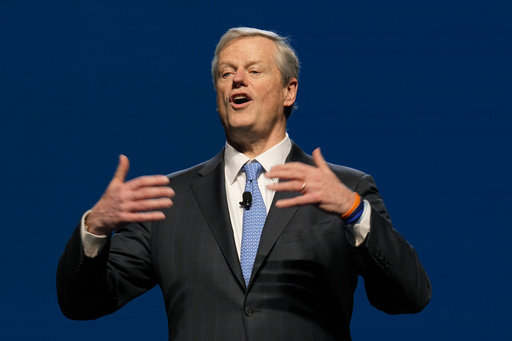Lily Meskers found herself contemplating an unexpected decision as she prepared to vote for the first time in a significant election.
The 19-year-old sprinter at the University of Montana received an inquiry from a group called Montana Together, which sought her participation in a name, image, and likeness (NIL) deal supporting Senator Jon Tester, a three-term Democrat aiming for re-election.
Although the initiative offered between $400 and $2,400 for video endorsements, Meskers declined due to her disagreement with Tester’s voting record on matters concerning transgender athletes in sports.
“To me, it felt like a political maneuver to regain support he might have lost,” Meskers expressed.
“As a female student-athlete, I cannot endorse someone who I feel does not support my rights.”
Unlike professional athletes like LeBron James and Colin Kaepernick, who are often vocal about social issues and political campaigns, college athletes typically remain less conspicuous, even in the face of financial incentives.
Experts note that taking a strong political stance may adversely affect their school’s reputation or jeopardize future endorsements from companies that prefer to avoid controversy.
There are notable instances of political activism among college athletes, such as a Texas Tech kicker who donned a shirt supporting former President Donald Trump during a game or several Nebraska sports figures joining an anti-abortion ad ahead of an election.
However, such activism is still viewed as a rarity.
“Many see political involvement as a risk; there are people advising against taking chances, especially when many are still trying to establish their careers,” stated Lauren Walsh, who founded a sports branding company 15 years ago.
She observed that student-athletes have a lot at stake, considering their futures and the presence of their families.
Notably, coaches sometimes express their political views more freely than their athletes.
For example, Bruce Pearl, coach of Auburn’s men’s basketball team, has publicly opposed Kamala Harris, while Oklahoma State football coach Mike Gundy stirred controversy with a t-shirt promoting a far-right media outlet.
Blake Lawrence, co-founder of the NIL platform Opendorse, highlighted that this election cycle marks the first since the NIL provisions were introduced in July 2021.
He noted an increase in college athletes participating in initiatives aimed at boosting voter turnout amongst the 18-to-24 demographic, with 86 athletes promoting civic engagement on social media in just the first half of the week.
However, Lawrence observed that many athletes are wary of endorsing specific political candidates or partisan causes.
“Young student-athletes are still developing the confidence to endorse any kind of brand,” he commented.
“If they’re hesitant to promote a local restaurant, they’re certainly going to be cautious when it comes to political expressions.”
Rather than engaging in partisan politics, many college athletes are choosing to promote voter engagement in a neutral manner.
For instance, NextGen America has enlisted players from various states like Arizona and Pennsylvania to motivate young people to vote. Meanwhile, The Team trained 27 college athletes in several states to lead initiatives aimed at increasing voter participation among students.
They also acquired commitments from over 625 coaches to promote civic engagement among their athletes.
Joe Kennedy, executive director of The Team and a former coach in the Obama administration, organized an event where panelists—including NCAA President Charlie Baker and WNBA stars—shared guidance with college athletes on leveraging their platforms for positive influence.
The Team has capitalized on the substantial voter turnout seen during the 2020 election, supported by the NCAA’s decision to allow Division I athletes the day off to vote.
Lisa Kay Solomon, founder of the All Vote No Play campaign, emphasized the necessity for athletes to learn how to express their values confidently.
“Young people need support in developing skills to articulate their beliefs,” Solomon remarked.
“It’s essential that they practice standing up for their values in a meaningful way.”
In 2021, Tennessee-Martin quarterback Dresser Winn made headlines by supporting a local political candidate, a move believed to be one of the first political NIL endorsements in college sports.
However, instances of similar endorsements have been scarce.
The consequences for athletes who voice political opinions can be severe, as illustrated by Colin Kaepernick’s sidelining in the NFL following his national anthem protest.
Meskers raised concerns about the implications of NIL deals linked to political endorsements.
“I believe that mixing NIL with political endorsements can complicate matters for both athletes and their educational institutions,” she mentioned.
“While I support NIL, I think it might create unnecessary complications.”
According to Walsh, established athletes like James and WNBA’s Ogwumike can afford to advocate for political issues thanks to their established reputations and strong supporter bases.
“They know who they are and are comfortable with their stances because their followers will stand by them regardless of the backlash,” she explained.
Audra Gillespie, an Emory University associate professor, highlighted that even broader cultural influencers like Taylor Swift and Eminem have demonstrated greater success in mobilizing young voters than in directly endorsing specific candidates.
Despite this, campaigns recognize the importance of young voters this election cycle, and athletes provide a relatable means to engage this demographic.
Recently, a group of Nebraska athletes featuring several softball players and a volleyball player participated in an advertisement advocating for two abortion-related initiatives.
Meskers noted that two athletes initially accepted to endorse Tester but later withdrew or chose not to comment.
For Meskers, the decision against the offer stemmed from Tester’s two votes against federal funding bans for schools allowing transgender participation in sports—a key issue for opponents of Tester’s re-election.
A representative for Tester indicated that the senator believes decisions regarding transgender athletes should rely on local governance and clarified that he has never supported allowing trans women to compete in women’s events.
Meskers asserted her belief in the influence of college athletes, stating her support for NIL but advocating for a clear distinction between financial deals and political endorsements.
“Student-athletes possess a powerful platform that can be used to encourage civic responsibilities like voting,” she concluded.
